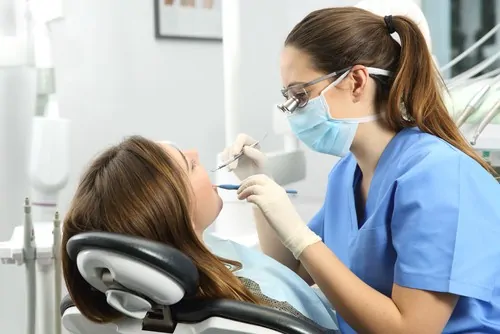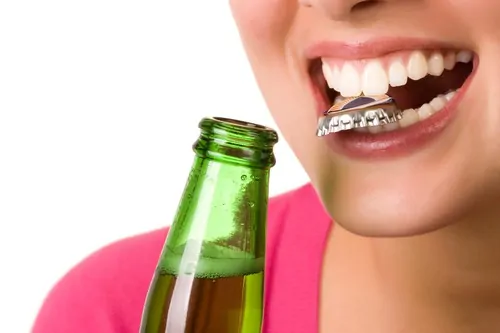5 Signs That It’s Time to See a Douglasville Dentist

While we always recommend visiting your dentist at least every six months, there are times when people fall out of the habit and miss a few appointments. Oftentimes a move to a new city or even a fear of the dentist can make it all too easy to pass on seeing the dentist as often as you should. However, the team at our Douglasville dental office want you to know that there are a few signs and symptoms that you shouldn’t ignore…
It’s Like a Desert In Here!
Experiencing dry mouth isn’t only uncomfortable, it’s also concerning. Having periods of occasional dryness is normal, especially with some forms of medication. However, if it becomes an ongoing issue and you just can’t seem to quench the dryness, you may want to see your dentist. Chronic dry mouth leaves the mouth exposed to bacteria and increases the risk for decay.
There’s An Unpleasant Smell
Sometimes bad breath is unavoidable (think a garlicky pasta dish). But when bad breath becomes chronic, it can be concerning. Bad breath that doesn’t go away is a symptom of gingivitis, or early gum disease. If gingivitis isn’t treated quickly and effectively, it can easily progress into gum disease and lead to tooth loss and other serious health problems.
Red & Puffy Gums
Any gum discomfort or discoloration should raise some red flags for you. Gums are supposed to be a healthy shade of pink, painless, and are definitely not supposed to bleed. Any inflammation, soreness, or blood when you brush or floss are all signs that your dentist will want to know about as soon as possible. These symptoms may indicate gum disease which, if left untreated, can lead to whole body problems such as stroke, heart disease, and diabetes.
You’re Feeling Sensitive
We don’t mean emotionally sensitive, but rather the zinging surge of pain associated with tooth sensitivity. Whether you notice an increase in sensitivity with eating hot or cold foods or while brushing, it’s something you should bring to the attention of your dental team. Sensitivity may be caused by something as simple as brushing too hard, but it can also be a sign of eroding enamel receding gums, both of which need professional treatment to fix.
You Have a Toothache
The most obviously sign that it’s time to schedule an appointment with a dentist in Douglasville is suffering from the unique pain of a toothache. The uncomfortable feeling of tooth pain isn’t something you should ignore, and it probably won’t go away on it’s own. Getting in to see a dentist is the best way to determine the root of the problem and get you some relief.
If you’re experiencing any of the symptoms listed above, we recommend scheduling an appointment at our dental office in Douglasville sooner rather than later. Many of these dental concerns can be treated easily and successfully if caught early. Don’t let the problem continue to worsen. Call to schedule a visit today.
The Common Cold and Dental Health

When you’re dealing with a cough that just won’t go away, you’d give anything to make it stop. So you do what anyone battling the common cold would do and head to your nearest pharmacy to load up on the best over-the-counter cough syrup you can find. While this remedy can finally make your coughing ease up, there is a link between this soothing fix and cavities that your Douglasville dentist wants you to know about.
The Danger is in The Ingredients
Most cough medicines and cough drops contain ingredients that, although made to help treat your cold symptoms, can also be damaging to your oral health. Many of the top medicines designed to help suppress that chronic tickle in your throat contain sugar and alcohol – both of which can contribute to tooth decay and other problems.
Sugar
Sugar is a common ingredient in many medicines for one reason – to make them not taste so horrible. However, these sugars are just the thing that bacteria love to feed on. When bacteria feed on sugars, they release a acidic byproduct. This acid wears away the protective tooth enamel and leave teeth exposed to decay.
Alcohol
A healthy mouth is one that produces saliva adequately and remains moist throughout the day. This saliva helps neutralize and rinse away acids caused by the sugar-eating bacteria. However, when alcohol is introduced into the mouth, saliva production is greatly decreased. Alcohol is naturally drying and inhibits your mouths ability to produce as much saliva as it should. A dry mouth is the perfect place for acid to wear away enamel, increasing the likelihood of decay.
Reduce the Risk
Just because your favorite cough medicine may contain these damaging ingredients doesn’t mean you have to suffer through your cold. There are a few ways you can reduce the risk of tooth decay and still find relief..
- Take your medicine with food. Saliva production increases while eating so it can help wash away dangerous sugars and acids.
- Avoid taking cough medicine right before bed. If you take medicine after you brush your teeth, the sugars and acids stay on your teeth all night.
- Try a pill form of the medicine instead of a liquid. A pill reduces the amount of damaging ingredients that come in contact with teeth.
At our dental office in Douglasville, it’s our mission to keep our patients healthy, especially during cold and flu season when germs are aplenty. Even if you try every trick in the book to keep germs at bay, sometimes catching the dreaded sore throat, stuffy nose, or constant cough is inevitable. When this happens, we want you to be cautious of how you ease the symptoms to keep your smile healthy.
Your Douglasville Dentist Says, “Eat Chocolate!”

We’ve got some fantastic news for all of our patients and neighbors with an active sweet tooth! It may come as a surprise, but the team at our Douglasville dental office is telling everyone to go ahead and eat chocolate — for your smile’s sake! But before you head out to buy a dozen of your candy bars, keep in mind that not just any chocolate will do.
Dark Chocolate: The Secret Cavity Fighter
Recent studies conducted by researchers in the United States, England, and Japan show a strong correlation between dark chocolate its ability to ward off decay, cavities, and problem causing plaque. There’s even some evidence to support the idea that dark chocolate may be just as effective, or perhaps more-so, at fighting off cavities as fluoride. However, we’re not suggesting that you pass on your regular fluoride treatments. More research and testing is needed before we can make an absolute claim as to effectiveness of dark chocolate.
Why Dark Chocolate?
It’s not necessarily the dark chocolate itself that has all the oral health benefits. In fact, most credit is being given to compounds found within dark chocolate, or more specifically the cocoa bean husk. All of the beneficial compounds found in dark chocolate are incredibly unique in that they have the ability to fight off both bacteria and plaque. There are even talks of one of these compounds, CBH, becoming an active ingredient in some dental products such as mouthwash and toothpaste because of its benefits.
Why is This Good News?
When we eat anything that contains a lot of sugar, we put our teeth at risk for decay and cavities. As we snack on these sweet treats, sugar gets left behind in the mouth. But it’s not the sugar itself that causes the problem, it’s the bacteria that feed on the sugar. As bacteria fuel up on leftover sugar particles, they also release acid as a byproduct. This acid wears away the protective enamel, leaving teeth exposed to decay. What’s so unique and interesting about dark chocolate is that the bacteria and plaque fighting compounds counteract this process by eliminating bacteria from the beginning.
Remember, Not All Chocolate is Good Chocolate
It’s important to remember that these studies and beneficial oral health claims are limited to dark chocolate and do not include milk chocolate or white chocolate. Even so, not all dark chocolate is created equal either. Try to find dark chocolate with less than 8 grams of sugar per serving. If you can get your hands on organic dark chocolate, that’s even better. Besides having oral health benefits, dark chocolate is also loaded with antioxidants and can be beneficial to overall health too, so don’t shy away from snacking on it.
As always, it’s also important, to maintain a proper oral hygiene routine at home and visit our dental office in Douglasville twice a year for an optimally healthy mouth.
Can All This Holiday Stress Affect Your Oral Health?

Every year around this time, we begin the hustle and bustle of the holidays. Coordinating schedules, braving the crowds at the grocery store and in the mall, cooking meals, and all the craziness that comes along with preparing for the holidays is bound to increase stress levels. But during a time when we’re supposed to be enjoying friends and family, stress is that last thing we want to get in the way. After all, as everyone at our dental office in Douglasville knows, stress can wreak havoc on not only our overall health, but oral health as well.
A Little Clench & Grind
During times of increased stress, we tend to subconsciously clench our teeth tightly together or grind them against each other. While this may seem like no big deal, if done repeatedly over a long period of time, grinding and clenching can cause damage to both the teeth as well as the jaw joint. Putting constant force on the teeth can lead to chipped, cracked, or fractured teeth, while habitually engaging jaw muscles may cause TMJ disorder. TMJ disorder can be painful and may lead to long term problems. So if you’re experiencing any popping, clicking, or locking in the jaw joint, we recommend contacting your Douglasville dentist.
Gum Disease
Usually we talk about gum disease being caused by an improper hygiene routine or missing regular visits with your dentist. However, recent research has also shown a positive link between stress and the development of gum disease. Gum disease is a serious condition that not only affects your mouth, but your whole body as well. If left untreated, gum disease can cause tooth loss, heart disease, and pregnancy complications, along with a host of other health problems.
Take It Easy for Health’s Sake
To help protect your body and oral health during the stressful holiday season, we encourage you find ways to help yourself relax. Check out the following tips for a few things to try.
- Breath it Out. Something as simple as setting aside a few moments to take a few deep breaths can really help lower stress. Practicing deep breathing exercises has been proven to lower blood pressure and reduce overall anxiety levels.
- Work it Out. Hit the gym, go for a walk, do some yoga. Whatever you choose to do, just get your heart pumping and sweat it out. Physical exercise can do wonders to decrease stress, and all the other health benefits don’t hurt either.
- Sleep it Off. It can be difficult to get enough sleep during non-crazy times of the year. And during the holidays it can be even harder. Remember to schedule in time to make sure you’re catching enough zzz’s. Giving your body a chance to relax can keep you healthy so you can actually enjoy everything the holidays have to offer.
From all of us at our Douglasville dental office, we hope you have a great holiday season with limited stress and anxiety and packed full of friends, family, laughs, and great memories.
6 Reasons to Quit Smoking

Every year on the third Thursday in November the American Cancer Society puts on the Great American Smokeout, which encourages smokers to try and quit once and for all. The team at our Douglasville dental office can certainly get behind an event that promotes health! Which is why we’re covering a few reasons why quitting smoking, even if you’ve tried before, is a worthwhile goal.
Smokers are 50% more likely to get gum disease than non-smokers
Advanced research has shown smoking has been linked to an increased risk of infection, including gum disease. Gum disease can be a painful problem that may eventually lead to tooth loss.
Smoking inhibits your body’s ability to heal
Whenever your body undergoes trauma, whether that’s a major surgery or minor cut, it relies on a strong flow of healthy blood to heal. Smoking, however, restricts blood vessels and diminishes the amount of blood that moves throughout the system.
Tobacco users are 6 times more likely to develop oral cancer
While oral cancer can occur in anyone, people who use tobacco are at a much greater risk. Oral cancer can affect the tongue, throat, cheeks, or any other area of the mouth. If caught early oral cancer can be successfully treated.
Yellow teeth and bad breath are incredibly common
Tobacco products contain tar and nicotine. Both of these ingredients can stick to teeth, gums, and the tongue and are difficult to remove. Because of this, smokers and users of other forms of tobacco usually have discolored teeth and unpleasant breath.
Using tobacco decreases saliva production
This may not immediately seem like a huge concern, but to your dentist in Douglasville, decreased saliva production could mean serious trouble. Saliva helps neutralize acids in the mouth and rinse away bacteria. Without it teeth are left exposed to the damaging elements and the likelihood of decay increases.
Tooth loss is 2 times more prevalent in smokers
Due to several of the other reasons above, such as a drier mouth and a decreased ability to heal, smokers are more likely to suffer more tooth loss than non-smokers. Oftentimes smokers may lose their teeth earlier than their non-using counterparts.
If you’re unsure where to start the quest towards a smoke-free life, we welcome you to call our dental office in Douglasville. We can work together to determine how quitting can benefit your oral and overall health and talk about ways you can try to quit.
Happy National Dental Hygiene Month!

October is commonly recognized as the month packed with pumpkins, scarecrows, trick-or-treaters, and all things Halloween. At our dental office in Douglasville, October has another important meaning that’s near and dear to our hearts; it’s National Dental Hygiene month – when we recognize our dedicated dental hygienists and bring awareness to the importance of proper oral health.
The Daily 4
Sponsored by the American Dental Hygienists’ Association (ADHA) and the Wrigley Oral Healthcare Program (WOHP), National Dental Hygiene Month has a different focus every year. In 2017, the theme is meant to drive awareness to the main components of a proper oral health routine including:
- Brushing
- Flossing
- Rinsing
- Chewing
The hygiene team that works closely with your dentist in Douglasville is dedicated to educating patients on the importance and proper techniques of these four crucial activities for a healthy mouth. Let’s take a closer look at each one…
Brushing
We’re all taught from an early age to brush our teeth before heading off to school in the morning and prior to hopping into bed at night. This lesson should follow us throughout our entire lives. But it’s not only important to brush every day, it’s crucial that you brush correctly every day. To make sure you’re getting the most out of your routine, always brush twice a day for two minutes each time and use gentle circles with your soft-bristled toothbrush.
Flossing
Brushing is only half of a healthy at home oral hygiene routine. You should absolutely floss in between each tooth every day. If you don’t, you leave about 35% of each tooth’s surface uncleaned and exposed to the dangers of decay.
Rinsing
Besides brushing and flossing, using a mouthwash that’s approved by the American Dental Association (ADA) can enhance your oral health. There are two types of mouthwash — cosmetic and therapeutic. Cosmetic mouthwash may temporarily mask bad breath but has no real oral health benefit, whereas therapeutic mouthwash with the ADA Seal of Acceptance has been tested to ensure it actually does what it claims, which is typically reducing bad breath, gingivitis, decay, and plaque.
Chewing
At our Douglasville dental office, we would love it if every one of our patients would brush their teeth after eating. But we understand that’s not always possible. Instead, we encourage patients to keep sugarless gum handy and chew it after meals. Chewing gum helps produce saliva, which then helps neutralize and rinse away bacteria left over from lunch. Just make sure it doesn’t contain sugar and look again for the ADA Seal of Acceptance.
These Daily 4 activities can go a long way in keeping your smile healthy. But even if you follow them exactly it’s still crucial to maintain your professional dental cleanings and bi-annual checkups. Regular dental visits help remove plaque and tartar and can help catch any potential problems early when treatment is still easy and more effective.
5 Things Every Dental Patient Should Know

A proper oral hygiene routine at home is just as important as your bi-annual dental appointments.
We typically recommend our patients visit us at least two times a year to have a dental checkup, professional cleaning, and sometimes digital x-rays. These appointments allow us to remove any plaque or tartar that may have built up since your last visit as well as monitor your oral health so we can catch and treat problems early. But these bi-annual visits are only half of what it takes to keep a mouth healthy. The American Dental Association (ADA) and your dentist in Douglasville recommend brushing your teeth twice a day, everyday, with a soft-bristled toothbrush and using gentle circles. It’s also critical to floss once a day to remove food particles and plaque from between teeth.
There’s such a thing as too much brushing.
Scrubbing your teeth may seem like a good idea, afterall, brushing harder must remove more plaque, right? Not necessarily. Brushing your teeth roughly can remove food particles, bacteria, and plaque, but it will also damage gum tissue and eventually cause it to recede. Once gum tissue recedes, the teeth appear longer and sensitivity tends to increase, making it difficult to enjoy some of your favorite cold or hot treats.
Sugary sweets aren’t the only foods that can cause cavities.
A commonly known fact is that a diet full of sugar typically results in more cavities. But a misconception is that sugar is the only cavity culprit. The truth is, many foods can affect oral health and contribute to decay. For example, foods high in carbohydrates like bread, pasta, and pretzels can feed bacteria in the mouth and cause cavities. Carbohydrates break down into simple sugars when eaten. Bacteria then feed on these sugars and eliminate an acidic byproduct. This acid then eats away at the protective tooth enamel, leaving teeth exposed to decay.
Bleeding gums are NOT normal.
Many people think that seeing a bit of blood in your sink as you brush or floss your teeth is normal. The truth is, no amount of blood is normal. Bleeding gums can be one of the first signs of gum disease which is a serious oral health problem that may not only lead to tooth loss, but can also affect the rest of the body. Gum disease has been linked to several systemic problems including diabetes, stroke, and heart disease.
Dry mouth can be a big problem.
We’ve all experienced some form of dry mouth before, whether as a result of being dehydrated or as a chronic issue. Having dry mouth that doesn’t go away could be dangerous for your overall oral health. A dry mouth is a sign that your body isn’t producing enough saliva to keep the mouth moist and rinse away bacteria. Without saliva there to do its job, bacteria is left to linger around, produce acid, and cause cavities.
If it’s time for your bi-annual dental cleaning and exam, call our Douglasville dental office to schedule an appointment.
Start This School Year with a Healthy Smile

As we all gear up to head back to school, loading up on folders, notebooks, pencils, and backpacks, the team at our dental office in Douglasville wants to send a friendly reminder to our patients and neighbors about the importance of getting your child (or yourself) to the dentist before school starts.
Dental Checkups Help with Overall Health, Too
While we encourage all of our patients to see us at least biannually, we also like to see them prior to starting a new school year. Visits to your dentist in Douglasville not only help keep smiles healthy, they also help keep whole bodies healthy. Poor dental health has been linked to:
- Diabetes
- Asthma
- Heart disease
- Obesity
In fact, the National Institutes of Health reported that 20-30% of children have chronic health conditions due to oral health. Regular dental exams and cleanings are key in catching any problems, or potential problems, early to avoid these serious diseases. It may also be recommended that your child receive protective sealants to aid against decay and cavities.
Keep Kids in School
It’s our goal to keep kids healthy and in school so they can learn, thrive, and get good grades. However, recent research has suggested that poor oral health has been linked to poor grades. According to the American Journal of Public Health Dentistry, children in elementary school missed 6 days of school on average each year. Of those 6 days, 2 of them were because of dental problems. As we all know, when kids aren’t attending class, they’re missing key elements of their education. What’s more, when they’re in pain due to a toothache brought on by a cavity, their ability to pay attention to lessons diminishes.
Hygiene at Home
Back to school dental visits are a great preventive step to ensure your child is starting the school year off healthy. But a good hygiene routine at home is equally important. Make sure your child is brushing every morning (after breakfast!) and every night for two minutes each time. Also, don’t forget to have them floss once a day.
Following a proper hygiene routine and maintaining appointments with our Douglasville dental office can keep you and your child smiling and in good health all the way through to summer break.
If you’re looking for a Douglasville dentist, schedule an appointment today!
6 Worst Habits for Your Smile

We all know that eating or drinking too much sugar can cause cavities, and by now we should all be aware of the oral health risks associated with smoking or tobacco use. But these common facts aren’t the only habits that may be affecting your smile. At our dental office in Douglasville, we know plenty of other habits that can be just as damaging. Check out some of the top, and perhaps surprising, culprits.
Biting Your Nails
Nail biting is an incredibly common habit that comes with its share of harmful side effects. Not only can biting your nail expose your body to the tons of bacteria that live under the nail, it can also cause damage to your jaw and smile. The act of nail biting cause the jaw to protrude at an unnatural angle, placing pressure on your jaw joint. If the habit continues, you could experience TMJ or TMD. What’s more, nails are made of a hard material and biting them off can cause teeth to chip or break.
Eating Ice Cubes
Ice cubes have one purpose and one purpose only — to make things cold. However, some individuals have a difficult time keeping themselves from chewing on these frozen cubes of water. Crunching on ice is a sure way to create tiny chips in the teeth, leaving them exposed to bacteria that cause cavities. Eating ice can also lead to bigger cracks or breaks that require cosmetic dentistry to fix.
Sucking on Lemons
Exposing your teeth to lemons also exposes them to the high amount of acid found in these colorful fruits. Acid of any kind erodes the protective layer of tooth enamel. Once the enamel is gone, you may experience increased tooth sensitivity as well as an increased risk for decay.
Brushing Your Teeth Too Hard
Your dentist in Douglasville encourages you to brush your teeth twice a day, but not just any type of brushing will do. Any scrubbing motion or using too much pressure can cause gums to recede. Instead, brush using gentle circles to get your smile clean and keep it protected.
Clenching and Grinding
Some people find themselves clenching or grinding in moments of stress. Others do it while they’re sleeping and don’t even know it. Either way, there are various types of dental issues that can occur as a result including jaw pain (TMJ/TMD), worn down teeth, or broken teeth.
Using Teeth as Tools
We’ve all used our teeth to open pesky packaging or to hold something when our hands were full, however it’s really not recommended. Ripping open stubborn packages or using your teeth for anything other than eating can chip teeth or cause other damage.
The team at our Douglasville dental office would prefer if all of our patients and neighbors had perfectly healthy smiles and never encountered any problems, which is why we put so much emphasis on preventing dental issues from ever occurring by educating them on things just like this. But we understand that things do happen, and when they do, we’re more than happy to help.
April is Oral Cancer Awareness Month
Nobody likes talking about any type of cancer. It’s a scary epidemic that continues to take the lives of thousands each and every year. Oral cancer, specifically, is a fairly common type of cancer in the United States with over 45,000 cases diagnosed every year. Of those diagnosed, about 9,700 will lose their battles with the disease. At our Douglasville dental office, we want to take time during Oral Cancer Awareness Month to educate our patients and neighbors on the risk factors and signs of oral cancer, and why it’s so important to catch it early.
The Importance of Early Detection
Oral cancer is very treatable when caught early, which is one of the reasons that maintaining appointments with your dentist is so important. In between your dental visits, it’s best to know the early signs of oral cancer so you’re able to seek treatment quickly.
Recognize the Signs
Oral cancer can develop anywhere from the lips, tongue, and cheeks to in and around the throat. But sometimes diagnosis can be tricky. A lot of oral cancer symptoms can easily be mistaken for other problems. If you recognize any of these signs, call your dentist in Douglasville immediately to schedule an oral cancer screening:
- Chronic bad breath
- A sore or several sores that don’t go away
- A lump on the cheek
- Difficulty swallowing
- Changes in your voice
Know the Risks
There are several lifestyle and hereditary factors that can increase someone’s risk of developing oral cancer. Please know that while these are common risk factors, anyone can develop oral cancer even if none apply to them.
- Gender: Men are two times more likely to develop oral cancer than women.
- Age: The majority of oral cancer patients are over the age of 55 and on average, most people are diagnosed at 62.
- Tobacco: Nearly 80% of oral cancer diagnoses are in tobacco users.
- Alcohol: About 70% of those diagnosed with oral cancer are heavy drinkers.
- Tobacco & Alcohol Combo: Those who use tobacco and drink heavily have a 15 times greater risk.
This Oral Cancer Awareness Month, take control of those risk factors that you CAN change and quit smoking, chewing tobacco, or using alcohol excessively. If you have other questions about oral cancer, call our dental office in Douglasville.
Welcoming patients from Douglasville, Lithia Springs, Villa Rica




